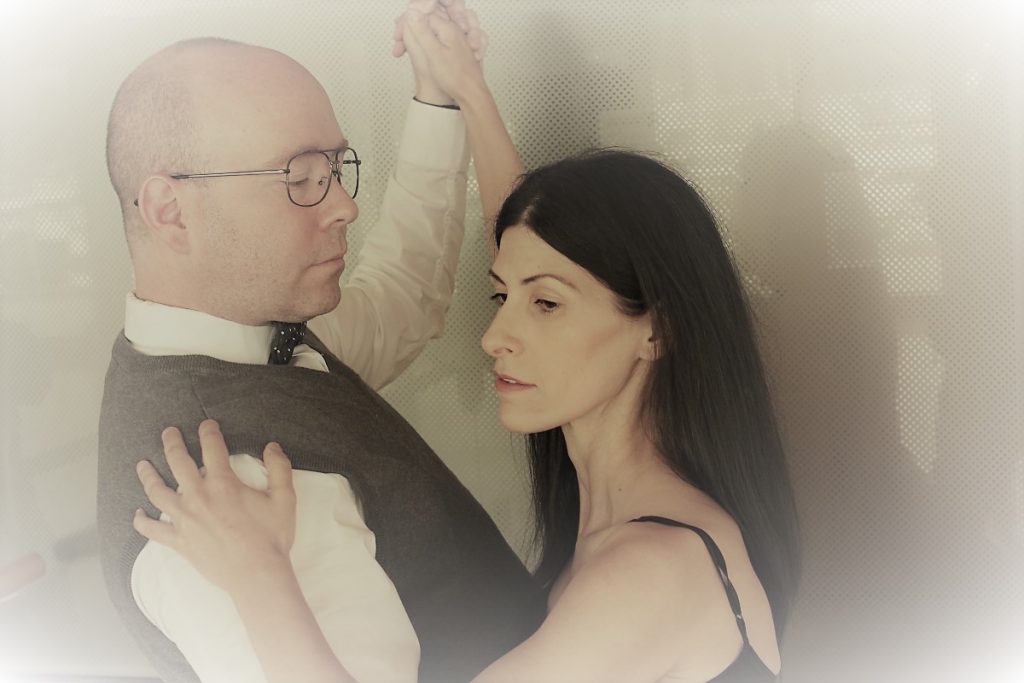
At Jericho Arts Centre until October 20, 2019
Tickets from $20 at tickets.theatrewire.com
Posted October 6, 2019
Dancing Lessons could go so wrong but this Naked Goddess Productions, under the always thoughtful direction of Sarah Rodgers, gets it right. Putting the autism spectrum on stage is a delicate business especially since the neurological disorder presents itself so variously and lends itself to lampooning at the expense of those not neurotypical.
In Mark St. Germain’s 2014 play, Ever Montgomery is high functioning: he’s a geoscience prof about to win a prestigious award at an upcoming event – a university awards’ dinner/dance. His problem? He is totally socially inept (think Sheldon in The Big Bang Theory) and can’t dance. His solution? Ask Senga Quinn, the dancer who lives two floors down in his apartment building, to teach him to dance. His offer? $2,153 (exactly) for a one-hour dance lesson.
Senga has just suffered an injury; her right leg is in a full-length brace and she’s popping pills and drinking booze straight out of the bottle. She may never dance again. She’s an angry mess.
Right away we question who is disabled here: the self-described “Aspie” (for Asperger’s syndrome) or the self-pitying dancer.
The playwright strikes some interesting notes: a romantic comedy plus illuminating information about autism plus end-of-the-world stats presented in mathematical precision by geoscientist Ever. “Five foot rise in ocean level by 2100.” By such-and-such a year, someone will be diagnosed with “Alzheimer’s every 45 seconds.” Ever is a virtual Wikipedia of statistics and dire predictions (which he recites with no anxiety).

Credit: Angelo Renai
As Ever, Andrew Coghlan at first brings a childlike simplicity to the role and his body language is perfect: arms held stiffly by his side, his movements awkward, almost robotic. Ever’s responses are off-the-wall and often very funny but Coghlan never diminishes the character. Indeed, as the pay progresses, Coghlan shows us how clever Ever actually is. In trying to figure out what emotion Senga is signalling, for example, Ever practises making facial expressions in his mirror until he sees it: fear. Now he knows what Senga is feeling and now he knows how to deal with her. He’s not only smart, he’s wise.
Costume designer Ella Heatley-Mulhall emphasizes Ever’s up-tight-ness with white shirt, woolen vest, tie, tweed jacket and sensible shoes.
Sandra Medeiros, as Senga, starts off brittle, hostile, angry at the world. Medeiros softens the character as the dancing lessons proceed over the course of what is under a week.
The dialogue is witty – mostly as it comes from observant Ever: “Theatre is like sports for those with no athletic ability.” Accused of joking, he says, “Why would I make jokes when I don’t understand them?” Those with autism, “can be successful alcoholics like everyone else” as he reaches for the high-proof scotch.

The dancing lessons, conducted over several days, present challenges for both Ever and Senga on many levels: Ever doesn’t seem to have any body awareness. Shaking his boody is not ever going to happen. And a smile – encouraged by Senga – is more grimace than smile. But the greatest challenge is that he cannot be touched. No handshakes, no hugs, no physical intimacy.
There is a breakthrough moment in Dancing Lessons that has the audience holding its breath. And then relaxing. It’s beautiful and it gets better. And funnier.
The speed with which things move is a little hard to credit but it makes for a heartwarming play with a nicely-avoided too-sweet ending.
Set design by Ariel Slack is realistic: stage left is Senga’s living room; stage right – indicated by Ever under a spotlight – is his apartment.
The material is sensitively handled, it’s a gently treated peek into the world of autism and it’s a reminder that disability comes in many guises. Finally, it’s about the courage to change. And speaking of courage, it’s a gutsy thing actor Andrew Coghlan throws himself into with such dedication. Dancing Lessons is a pas de deux with a difference.

